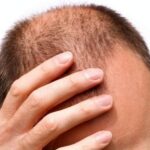The Link Between Nutrition and Hair Loss,
Hair loss is a common concern for many people, and it can be influenced by various factors, including genetics, age, and overall health. One often overlooked factor is nutrition – what we eat can play a significant role in the health of our hair. Understanding the link between nutrition and hair loss is essential for anyone looking to maintain healthy hair and prevent excessive shedding. In this article, we will explore how your diet can impact your hair health and discuss some effective prevention strategies you can incorporate into your routine.
Affiliate Disclosure
As an Amazon Associate, I earn from qualifying purchases made through the links provided on this site. Rest assured, this won’t affect your cost in any way.
Link Between Nutrition and Hair Loss,
Your diet impacts hair loss by providing essential nutrients vital for hair health. Nutrient deficiencies can lead to hair loss. To prevent this, consume foods rich in vitamins, minerals, and proteins. Adopting healthy lifestyle habits and proper hair care practices is crucial for maintaining hair vitality.
Here are some effective prevention strategies you can incorporate into your daily routine
Balanced Diet
A balanced diet means eating a variety of healthy foods to keep your body and hair strong and healthy. This includes foods like fruits, vegetables, lean meats, and good fats. Eating a balanced diet helps provide the nutrients your hair needs to grow well and stay healthy.
Hydration
Hydration means drinking enough water every day to keep your body and hair healthy. Water helps to keep your scalp moisturized, which is important for healthy hair growth. When you’re hydrated, your hair is less likely to become dry and brittle, reducing the risk of breakage and promoting overall hair health.
Gentle Hair Care
Gentle hair care means treating your hair with care and kindness to keep it healthy and strong. This involves using mild shampoo and conditioner, avoiding excessive heat from styling tools, and being gentle while brushing or styling your hair. By being gentle with your hair, you can prevent damage and breakage, leading to healthier hair over time.
- Argan Oil Shampoo and Conditioner Set – Moisturizing Sulfate Free (check on amazon)
Supplements
Supplements are pills or tablets that you can take to add extra vitamins, minerals, or other nutrients to your diet. These can include things like biotin, vitamin D, or omega-3 fatty acids. If your regular diet doesn’t give you enough of these important nutrients, supplements can help make sure your body, including your hair, gets what it needs to stay healthy.
- Vital Vitamins Multi Collagen Plus – Biotin, (check on amazon)
Scalp Care
Scalp care involves keeping your scalp clean and healthy to promote strong and healthy hair growth. This includes regular washing with a gentle shampoo to remove dirt and oil, as well as moisturizing to prevent dryness and flakiness. Massaging your scalp can also help stimulate blood flow and promote hair growth. Taking care of your scalp is essential for maintaining overall hair health.
Stress Management
Stress management means finding ways to handle and reduce stress in your life. Too much stress can affect your overall health, including your hair. Techniques like meditation, deep breathing, exercise, or spending time doing things you enjoy can help lower stress levels. Managing stress can help prevent hair loss and promote healthier hair growth.
Regular Exercise
Regular exercise means engaging in physical activities on a consistent basis. This could include activities like walking, jogging, swimming, cycling, or participating in sports. Exercise is beneficial for overall health, including hair health, because it improves blood circulation throughout the body, including the scalp. Better blood circulation can promote healthier hair follicles and stimulate hair growth. Therefore, incorporating regular exercise into your routine can contribute to maintaining healthy hair.
Avoiding Harsh Chemicals
Avoiding harsh chemicals means staying away from strong or harmful substances that can damage your hair. These include certain hair dyes, bleaches, relaxers, and other chemical treatments. Harsh chemicals can weaken the hair shaft, causing it to break and become brittle. By avoiding these chemicals, you can help protect your hair from damage and maintain its strength and vitality.
Regular Haircuts
Regular haircuts involve trimming your hair regularly to maintain its health and appearance. Getting your hair trimmed every few weeks helps prevent split ends, which can lead to breakage and make your hair look unhealthy. By keeping your hair regularly trimmed, you can promote healthier growth and maintain its overall strength and vitality.
Consultation
If you’re experiencing significant hair loss, consult a healthcare professional or dermatologist for personalized advice and treatment options.
Conclusion
Understanding the connection between nutrition and hair loss is vital for maintaining healthy hair. By incorporating strategies such as a balanced diet, hydration, gentle hair care, supplements, scalp care, stress management, regular exercise, avoiding harsh chemicals, and regular haircuts into your routine, you can promote stronger, healthier hair growth and minimize the risk of excessive shedding.
similar articles
- how to create a healthy natural hair routine
- 17 Home remedies for hair growth and thickness
- How to Prevent Hair Loss Naturally at home
- Medical Treatments for Hair Loss Prevention (What You Should Know)
- which vitamin deficiency causes hair loss
- How to Stop Black Hair Dye from Fading
- Top 9 Hair Loss Prevention Tips for Women

Pingback: 9 protective hairstyles for straight hair - hair insight
Pingback: Hair Loss Prevention for Men 2024 - hair insight
Pingback: 7 causes for dry hair and how to fix it - hair insight %